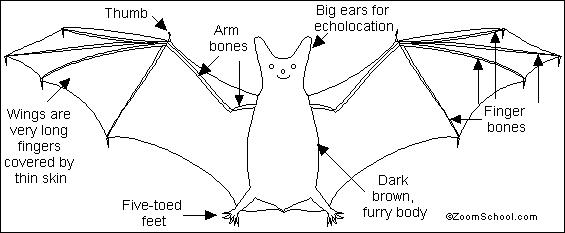
 |
| You might also like: | Nocturnal Animals Calendar 2004 | Fruit Bat Printout | Bat Shape Book: Facts | Bat Shape Book: Vampire Bat | Student Research Activity - Bat Quiz | Today's featured page: Farm Crafts |
| More on Bats | EnchantedLearning.com Vampire Bat Desmodus rotundus | Animal Printouts Label Me! Printouts |


Anatomy: Bats' wings are long fingers covered by thin skin, and they have furry bodies. These tailless mammals have weak legs and don't walk very well. Vampire Bats have a wingspan of only 8 inches (20 cm). The body is the size of a person's thumb.
Senses/Diet: Vampire Bats can see, but use echolocation as their primary sense in order to find insects and small animals to eat. While flying, these bats send out high-pitched sounds that bounce off other objects. The bat listens for the bounced sound, and can determine where objects are located. People cannot hear these high-pitched sounds. The vampire bat is the only bat (and the only mammal) that eats blood, preying on cattle, horses, large birds and pigs. Vampire bats don't suck animals' blood, they make a small hole with their two very sharp incisor teeth and lap up the blood, which doesn't clot (thicken) because of anti-coagulants (anti-thickeners) in the bat's saliva.
| Search the Enchanted Learning website for: |